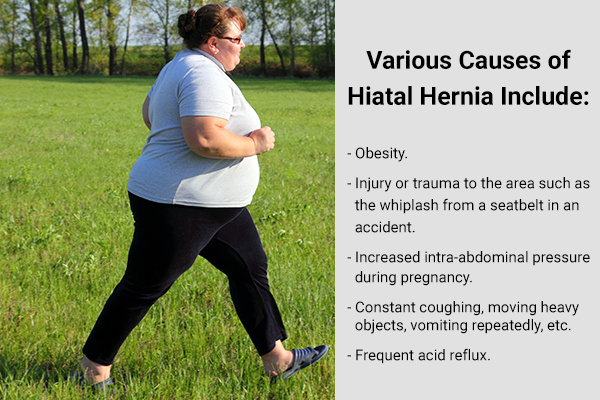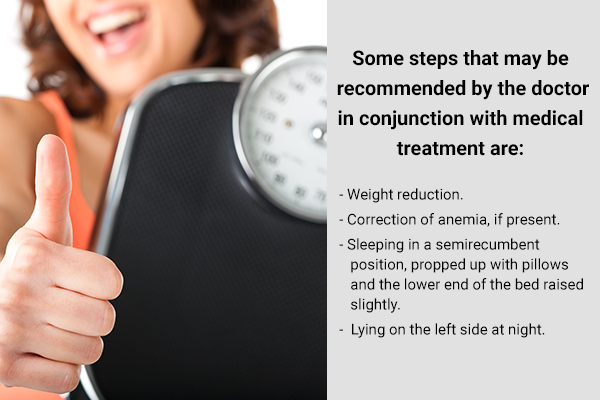In this article:
What is hernia? A hernia occurs when a sac is formed when the peritoneum (lining of the abdominal cavity) comes through a hole or weak area in the strong layer of the belly wall.

There are various types of hernia, and the most common are inguinal hernias, femoral hernias, incisional hernias, umbilical hernias, epigastric hernias, and diaphragmatic hernias, which are also known as hiatal hernias. (1)
Hiatal hernia is also called diaphragmatic hernia due to the defect in the diaphragm, and it occurs when a portion of the stomach pushes upward through the diaphragm and into the chest. (1) It can lead to gastric and related symptoms such as heartburn, acid reflux, chest pain, and difficulty swallowing.
Some hiatal hernias are asymptomatic and do not require treatment, whereas others may need to be treated with medications, lifestyle changes, or surgery, depending on the severity of the symptoms and the overall health of the patient. (1)
Hiatal hernias are common, and they usually occur in people over the age of 50. (2) This article will talk about the hiatal hernia in detail. Read on to know more.
What Are the Types of Hiatal Hernia
Sliding hiatal hernia and para-esophageal hiatal hernia are the two main varieties. Hiatal hernias can be divided into three or four different categories depending on how the para-esophageal hernias are divided.
1. Type I
Type I hiatal hernia, also known as sliding hiatal hernia and concentric or axial hiatal hernia. It accounts for more than 95% of all hiatal hernias.
In type I hiatal hernia, the esophageal junction widens, along with a loss in elasticity (laxity) of associated ligaments/ membranes. This widening of the junction, coupled with the loss in tone, leads to a displacement of the junction and some parts of the stomach above the diaphragm. (3)
2. Type II
Type II hiatal hernia is a subtype of para-esophageal hernia. In this kind of hernia, part of the gastric fundus, and not the junction itself, protrudes through the diaphragm beside the esophagus.
Over time, this type of hernia progressively enlarges and requires surgery to restore the herniated portion to its normal position. (3)
3. Type III
Type III hiatal hernia is a combination of type I and II hiatal hernias. Along with the para-esophageal hiatal hernia, the gastroesophageal junction is moved above the diaphragm. (3)
4. Type IV
Other abdominal organs (such as the spleen, colon, and pancreas) can herniate through the esophageal hiatus, known as a type IV hiatal hernia.
Due to the continuous enlargement of the esophageal hiatus along with a large defect in the associated ligaments/membranes, the abdominal organs get displaced above the diaphragm. Hence, it is a progressive form of type III hiatal hernia. (3)
Causes and Risk Factors of Hiatal Hernia
Various causes of hiatal hernia include:

- Obesity (4)
- Injury or trauma to the area such as the whiplash from a seatbelt in an accident (4)
- Increased intra-abdominal pressure during pregnancy (5)
- Constant coughing, moving heavy objects, vomiting repeatedly, and straining during bowel movements, can all put tremendous pressure on the nearby muscles (6)
- Frequent acid reflux (called gastroesophageal reflux disease; GERD)
The most classic symptom found in hiatal hernia is gastroesophageal reflux, whose symptoms include regurgitation and heartburn. Less common symptoms include dysphagia (difficulty in swallowing), epigastric or chest pain, and even chronic iron deficiency anemia.
Large hernias may cause regurgitation, dysphagia, or early satiety. (4)
Risk factors of hiatal hernia
Age and being overweight are the main risk factors for the development of hiatal hernia. Multiple pregnancies, esophageal surgery history, partial or complete gastrectomy, and specific skeletal system problems linked to bone decalcification and degeneration are all recognized risk factors. (4)
While there are no definitive causes for hiatal hernias, obese people and older women tend to develop hernias.
Symptoms of Hiatal Hernia
Most hiatal hernias are small and don’t cause any symptoms. However, a large hiatal hernia can cause heartburn and other GERD symptoms. (7) It may cause difficulty swallowing and chest pain. (8)
Type I hernias, in particular, induce no symptoms the majority of the time. They may cause symptoms such as burping, heartburn, nausea, vomiting, and/or acid reflux. (4)
More severe symptoms could be brought on by a type II, III, or IV hernia. These may consist of:
- Pain in the chest and pain in the abdomen are both potential signs (which can be indicated by blood in vomit, red or black stool, anemia, and blood test indicating loss of blood)
- Changes in the voice
- Early satiety (feeling full after only a small amount of food)
- Occasional difficulty swallowing solid food
- Difficulty breathing after meals
- Acid reflux
- Regurgitation, or a feeling that food is “sticking” (4)(9)
Treatment Modalities for Hiatal Hernia
The course of treatment for a hiatal hernia will be determined by your doctor on the basis of the extent and position of the hernia and severity of symptoms such as acid reflux. (6)
The preferred treatment for GERD symptom relief, according to the American College of Gastroenterology, is an 8-week course of proton pump inhibitors (PPIs), with no significant differences in efficacy amongst the various types of PPIs. Patients whose symptoms don’t respond well to once-daily PPI therapy can be advised to switch to twice-daily PPI. (4)
For the hiatal hernia to be fixed, surgery may be required. When a sliding hernia and GERD symptoms are present, surgery may be an option, particularly when regurgitation continues after PPI medication.
Laparoscopy under general anesthesia may be used to treat a hiatal hernia. (4)
A doctor may recommend surgery if one or more of the following indications are present:
- Bleeding
- Pulmonary aspiration (when food or fluid enters the lungs instead of the esophagus)
- Strangulation of the herniated portion (a severe complication)
- Esophageal strictures (a narrowing of the esophagus causing difficulty in swallowing) (4)

Some other steps that may be recommended by the doctor in conjunction with medical treatment are:
- Weight reduction
- Correction of anemia, if present
- Sleeping in a semirecumbent position, propped up with pillows and the lower end of the bed raised slightly
- Lying on the left side at night (10)
Diagnosing Hiatal Hernia
Because of the shifting of the structure of the gastroesophageal junction during gastric emptying, respiration, and movement, the diagnosis of a hiatal hernia can occasionally be quite difficult.
A thorough history and physical examination are required since they could detect symptoms that weren’t previously noticeable.
Diagnostic tests could include:
- Upper CT scans
- Chest X-rays
- pH testing to assess reflux of gastric contents
- Barium swallow radiography
- Upper gastrointestinal studies
- High-resolution manometry, which is one of the best tools for localizing parts of the gastroesophageal junction for prolonged periods in real time (4)
Complications Associated With Hiatal Hernia
Some possible complications of a hiatal hernia are:
- Esophagitis (inflammation of the esophagus) and its ulceration
- Aspirational pneumonia due to refluxed fluids
- Peritonitis, which is inflammation of the membrane covering the abdominal organs and lining the abdominal wall
- Bleeding, whether mild or major
- Excruciating pain or shock brought on when a major piece of the stomach becomes trapped above the diaphragm, which, if left untreated, can lead to perforation, strangulation, or gangrene of the herniated stomach portion and, hence, requires immediate surgery (3)
When to See a Doctor
You should visit a doctor if you have any of the following symptoms:
- Difficulty or pain while swallowing
- Frequent vomiting, especially with blood in the vomit
- Unexplained weight loss
- Chest pain
- Blood tests showing low red blood cell (RBC) and low hemoglobin counts (7)
Final Word
The majority of the time, a little hiatal hernia is unproblematic. If your doctor doesn’t find it when looking for another condition, you might not even be aware that you have one.
But a significant hiatal hernia can lead to acid and food reflux, which can result in heartburn. Typically, self-care techniques or drugs help alleviate these symptoms. Surgery can be necessary for a very big hiatal hernia.
 Continue Reading5 Ways to Manage Hiatal Hernia Symptoms at Home
Continue Reading5 Ways to Manage Hiatal Hernia Symptoms at Home
- Was this article helpful?
- YES, THANKS!NOT REALLY


